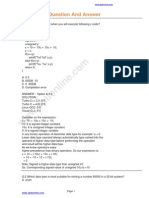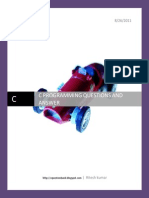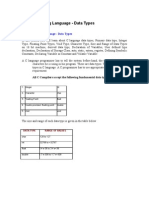C Programming Floating Question
Uploaded by
Praveen BhardwajC Programming Floating Question
Uploaded by
Praveen Bhardwaj1.
What are the different types of real data type in C ? A. C. float, double float, double, long double B. D. short int, double, long int double, long int, float
View Answer C Compiler Report Discuss in Forum 2. What will you do to treat the constant 3.14 as a long double? A. C. use 3.14LD use 3.14DL B. D. use 3.14L use 3.14LF
View Answer C Compiler Report Discuss in Forum 3.
If the binary eauivalent of 5.375 in normalised form is 0100 0000 1010 1100 0000 0000 0000 0000, what will be the output of the program (on intel machine)?
#include<stdio.h> #include<math.h>
int main() { float a=5.375; char *p; int i; p = (char*)&a; for(i=0; i<=3; i++) printf("%02x\n", (unsigned char)p[i]); return 0; } A. C. 40 AC 00 00 00 00 AC 40 B. D. 04 CA 00 00 00 00 CA 04
View Answer C Compiler Report Discuss in Forum 4. Which of the following range is a valid long double (Turbo C in 16 bit DOS OS) ? A. C. 3.4E-4932 to 1.1E+4932 1.1E-4932 to 1.1E+4932 B. D. 3.4E-4932 to 3.4E+4932 1.7E-4932 to 1.7E+4932
View Answer C Compiler Report Discuss in Forum 5.
Which statement will you add in the following program to work it correctly?
#include<stdio.h>
int main()
You might also like
- Questions-Problem Solving Through Programming in C-MCQs On Data Handling - Set 1-20240612-0142No ratings yetQuestions-Problem Solving Through Programming in C-MCQs On Data Handling - Set 1-20240612-01423 pages
- Lect 6 Programming Logic Using ‘C’ Data TypesNo ratings yetLect 6 Programming Logic Using ‘C’ Data Types30 pages
- 2022-09-06 Lecture 07 - Program Control - IiNo ratings yet2022-09-06 Lecture 07 - Program Control - Ii12 pages
- Vision Cs 2024 Data Sturcture Programming C Programming 15No ratings yetVision Cs 2024 Data Sturcture Programming C Programming 1533 pages
- CPNM Lecture 2 - Basic Data Types and Formatted Input OutputNo ratings yetCPNM Lecture 2 - Basic Data Types and Formatted Input Output31 pages
- (A) What Scalar Types Are: C Type HierarchyNo ratings yet(A) What Scalar Types Are: C Type Hierarchy9 pages
- Learn Data Types in C and C++ With Example in Just 4 MinsNo ratings yetLearn Data Types in C and C++ With Example in Just 4 Mins13 pages
- Lecture 5,6 Escape Charecters and Data Types in CNo ratings yetLecture 5,6 Escape Charecters and Data Types in C16 pages
- Scientific Programming in C II. Data Types: Susi LehtolaNo ratings yetScientific Programming in C II. Data Types: Susi Lehtola19 pages
- C Programming for the Pc the Mac and the Arduino Microcontroller SystemFrom EverandC Programming for the Pc the Mac and the Arduino Microcontroller SystemNo ratings yet
- Document Outlines Organization's Examines Current Status Terms Strengths Weakness SWOT Analysis Sets Long-Term Objectives Short-Term TacticsNo ratings yetDocument Outlines Organization's Examines Current Status Terms Strengths Weakness SWOT Analysis Sets Long-Term Objectives Short-Term Tactics1 page































































